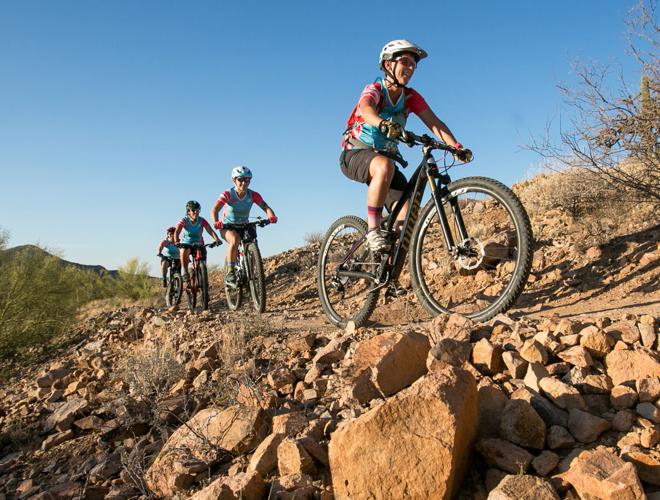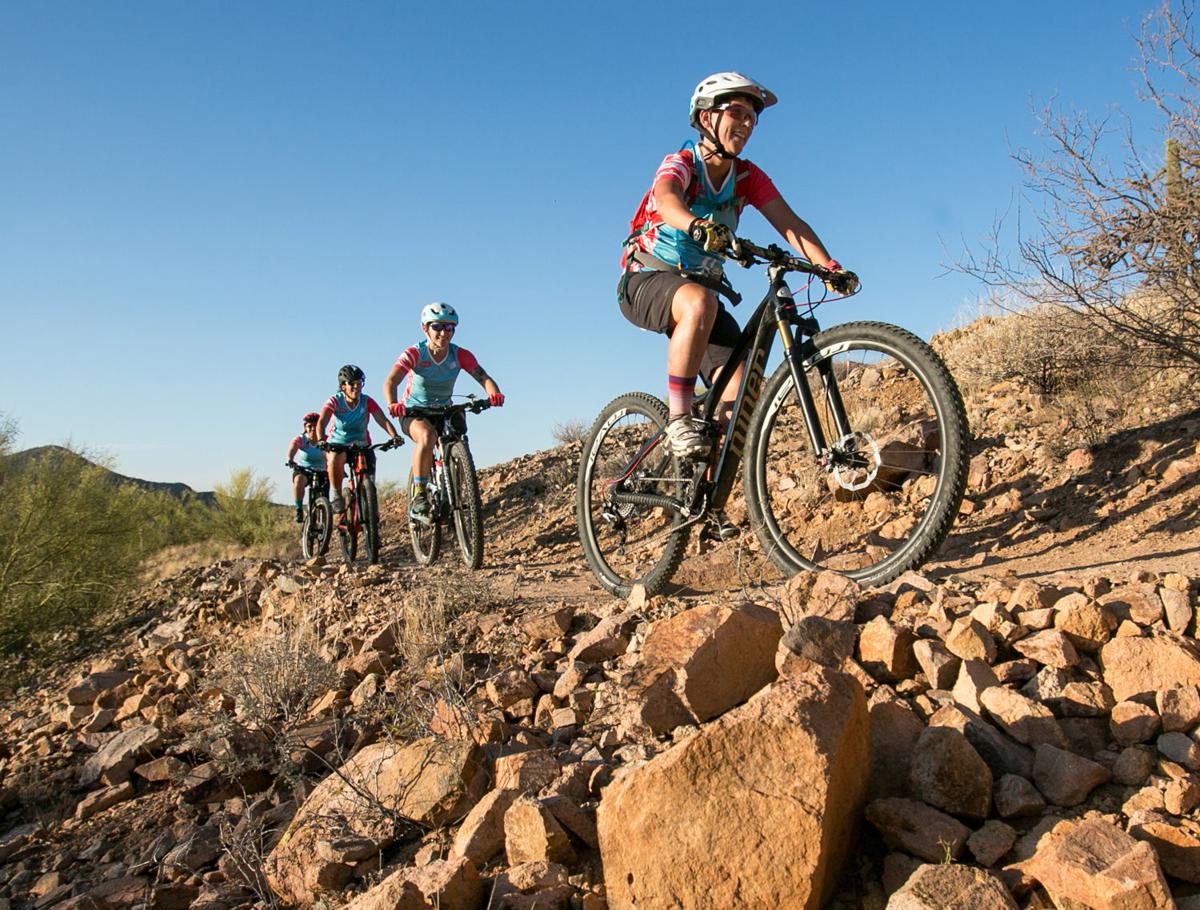Sixteen-year-old Chloe Welch is not afraid of falling off her mountain bike.
Been there, done that.
Earlier this year, a fall from her bike landed Chloe with a concussion.
“And a couple of weeks ago, I was able to just get back on and ride my bike again with the 50-mile mountain bike race,” says the Tucson High sophomore. “I had the time of my life.”
Chloe’s passion for the sport is exactly what Veronique Pardee wants to replicate in women throughout Tucson.
Pardee, a senior attorney for CopperPoint Mutual Insurance Co., is one of eight Bell Joy Ride ambassadors in cities across the U.S. and Canada. She applied for the ambassadorship in fall 2015 and started hosting events earlier this year.
The program is a pilot of Bell Helmets and modeled after a Santa Cruz, California, initiative by Jessica Klodnicki, executive vice president and general manager for the brand.
Locally, the ambassadors plan events and monthly rides with the intent of increasing the number of women biking in each community.
Last Sunday, Pardee’s event “Ride Like a Girl — A Celebration of the Future of Our Sport” took 56 women and girls ages 12 and older mountain biking on skill-level-appropriate trails in Catalina State Park.
“The whole goal of the program is to satisfy everyone, to have a ride that is good for everyone, and that everybody has fun,” says Pardee, 46. That means creating connections and empowering both experienced and novice riders.
Pardee has been riding a bike her entire life — she didn’t have a car until age 27 — but didn’t get into mountain biking until she moved to Tucson 15 years ago and met Serena Haroian.
“I guess I was totally terrified during that first ride, and I was new to Tucson, so I was totally in awe of the desert,” says Pardee, who grew up in Chicago and then lived in Philadelphia. “Everything on the East Coast is marked and signed, and we were in this place where there were no signs and the trails went everywhere, and it just had this crazy, wild feel to me.”
The rocky terrain and prickly cactus — and the consequences of a fall — captivated Pardee. She took her first ride on a Starr Pass trail and loved it, injuries notwithstanding.
Haroian, 52, remembers Pardee’s first ride on a bike that “was probably a good size-and-a-half too big for her. She was sitting up as though she was riding on a sidewalk, kind of straight up and bouncing around and really having a good time.”
Pardee now squeezes trail rides in as often as she can and bikes to work when possible.
“I have a rack of suits in my office, but it’s tough to show up at court on a bicycle, especially when it’s hot,” she says.
Since that first trail ride, Pardee has learned that her consistency with the sport often depends on having other women to ride with.
“It can be a dangerous sport, so I’ll go by myself, but it won’t be on the harder trails, and I won’t push my skill levels by myself,” she says.
In 2014, Pardee attended a mountain biking camp in Durango, Colorado, as a coach with El Grupo Youth Cycling. There, she learned about a women’s mountain biking camp through Trek Dirt Series. The camp took her back to basics and then challenged her to improve. Riders didn’t just skip over tricky terrain. Instead they “sessioned” it, meaning they practiced the section again and again in pursuit of success.
“That was the first time I experienced that environment and an all-women’s ride, and it was so much fun,” Pardee says. “The vibe was just so different than co-ed rides, what I call ‘dude-bro rides,’ because it’s all men and maybe two women. ... There’s plenty of that and a place for that, for sure. Riding with guys will push your skills, definitely ... but the supportive vibe was just so fun, I wanted to come home and create that here in Tucson.”
So Pardee and Haroian started the women’s meetup group In Session — a play on sessioning a trail and courts being in session.
“Women have been historically underrepresented in mountain biking as far as numbers go, and there has been a push to get more women out on bikes for at least five to seven years,” says Martha Lemen, one of the Joy Ride trail leaders and the instructor of Sunday’s skills clinic. “We are seeing results. More women are coming out, and I see more women on the trails.”
Hillary Mathis, 39, hasn’t been on a Joy Ride, but she has seen that disparity on group rides with the Southern Arizona Mountain Bike Association. In years past, she has tried to launch group rides for women there with little success, but an uptick in regular female riders has her ready to try again.
At Bicycle Ranch, 7090 N. Oracle Road, owner Steve Morganstern says he also notices retailers paying more attention to what gear and clothing women mountain bikers might like. The generic “shrink it and pink it” mentality is changing, he says.
“I can tell you we live in a great town to be a mountain biker,” says Lemen, who has taught the sport for about 25 years and is a board member of the Sonoran Desert Mountain Bicyclists. “There are over 400 miles of trail we can ride in the surrounding mountains and foothills.”
The International Mountain Bicycling Association, of which the Sonoran Desert Mountain Bicyclists is a chapter, named Tucson a silver-level city for the sport. That is one of the reasons Pardee is so determined to make mountain biking more attractive to women. She believes Tucson is a biker’s mecca.
She applied for the Bell Joy Ride ambassadorship in fall 2015, and has hosted an event every month since February. The events have drawn anywhere from 25 to 55 women, allowing participants to break into groups based on skill level, an option not usually available with fewer riders.
“Usually, the rides I have been on, there aren’t enough people to do that,” Pardee says. “And you ride in a line ... and you naturally get into a pecking order of who’s the faster rider and who’s the slower rider. ... If you’re the slowest rider, people are waiting for you for potentially 10 minutes, and then you feel pressured to keep up.”
Lisette Wells-Makovic, 44, is one of Pardee’s Joy Ride leaders. She started mountain biking about eight years ago and then got involved with In Session.
“I was mainly riding with a bunch of guys before, and that’s typical when women start riding,” she says, noting that many women learn with their boyfriends or husbands. “You’re pedaling to keep up as opposed to paying attention to your riding. ... You’re getting a lot of fitness, but not a lot of skills work.”
And while that’s not necessarily true of all co-ed rides, Pardee sees value not just in developing skills, but in creating camaraderie among women. That’s why the free Bell Joy Rides start with treats and coffee and conclude with drinks — all donated by the community.
“We don’t want to be the only game in town,” Pardee says, referring to rides for women through the Southern Arizona Mountain Bike Association. She has also ridden with a group in Oro Valley. “We want to be encouraging collaboration.”
As more women ride, more retailers and race directors take notice, she says. That, in turn, attracts higher-quality riders.
“I think it’s amazing,” says 16-year-old Chloe. “I think mountain biking is a really good, empowering type of thing for women.”




